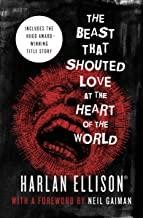Harlan Ellison
(1934–2018), prolific Cleveland-born and -bred writer known for his influential
work in New Wave speculative fiction (and for his outspoken, combative personality). His published works include more than 1,700 short stories (such as “The Beast That Shouted Love at the Heart of the World”), novellas, screenplays, comic book scripts, essays, a wide range of criticism, and teleplays. Among his best-known works are his A Boy and His Dog cycle and his short stories I Have No Mouth and I Must Scream and “Repent, Harlequin!” Said the Ticktockman, a “nonlinear” narrative that the begins in the middle, then moves to the beginning, then the end, without the use of flashbacks.
First appearing in the science fiction magazine Galaxy in December 1965, it won the 1966 Hugo Award, the 1965 Nebula Award and the 2015 Prometheus Hall of Fame Award. The story has been translated into numerous foreign languages.
Ellison is also credited with writing what is widely regarded as Star Trek’s greatest episode. Countless critics have pointed to “The City on the Edge of Forever” as the ultimate expression of what Star Trek can be, challenging notions of war, peace, and moral decision-making. Ellison was also responsible for the important anthologies Dangerous Visions (1967) and Again, Dangerous Visions (1972).

Some of Ellison’s own “dangerous visions,” now a collector’s item (Signet Books)
According to Wikipedia, Ellison won eight Hugo Awards in all, a shared award for the screenplay of A Boy and his Dog that he counted as “half a Hugo,” and two special awards from annual World SF Conventions; four Nebula Awards of the Science Fiction and Fantasy Writers of America (SFWA)—he is also the only three-time winner of the Nebula Award for Best Short Story; five Bram Stoker Awards from the Horror Writers Association (HWA);] two Edgars from the Mystery Writers of America;] two World Fantasy Awards from annual conventions] and two Georges Méliès fantasy film awards. Stephen King considered Ellison’s collection Strange Wine one of the best horror books published between 1950 and 1980.
Born to a Jewish family in Cleveland, the son of Serita (née Rosenthal) and Louis Laverne Ellison, a dentist and jeweler, Harlan moved with his family to Painesville as a boy, but returned to Cleveland in 1949 following his father’s death. He loved to tell the story later in life of how, as a Cleveland youth mad for science fiction, he was once caught red-handed trying to smuggle a paperback out of Kay’s Books on Prospect. He frequently ran away from home, he said, because of discrimination at the hands of his high school peers, and attended Ohio State University for just 18 months (1951–53) before being expelled for hitting a professor who had denigrated his writing ability. Over the next 20 or so years he sent that professor a copy of every story he published.
Ellison made his last public appearance in September 20067 when he attended the Midwest debut at Cleveland Public Library of a documentary about himself titled Dreams with Sharp Teeth composed of original and archive footage of Ellison and talking head segments from colleagues and fans including Robin Williams.
In his 1984 obituary The New York Times described Ellison as “a furiously prolific and cantankerous writer whose science fiction and fantasy stories reflected a personality so intense that they often read as if he were punching his manual typewriter keys with his fists.” He saw storytelling, said the Times, “as a ‘holy chore,’ which he pursued zealously for more than 60 years. . . . And although he was ranked with eminent science fiction writers like Ray Bradbury and Isaac Asimov, he insisted that he wrote speculative fiction, or simply fiction.”
Ellison was very adamant about that. “Call me a science fiction writer,” he reportedly once said in an interview on the Sci-Fi Channel (Now SyFy) and “I’ll come to your house and I’ll nail your pet’s head to a coffee table. I’ll hit you so hard your ancestors will die.”